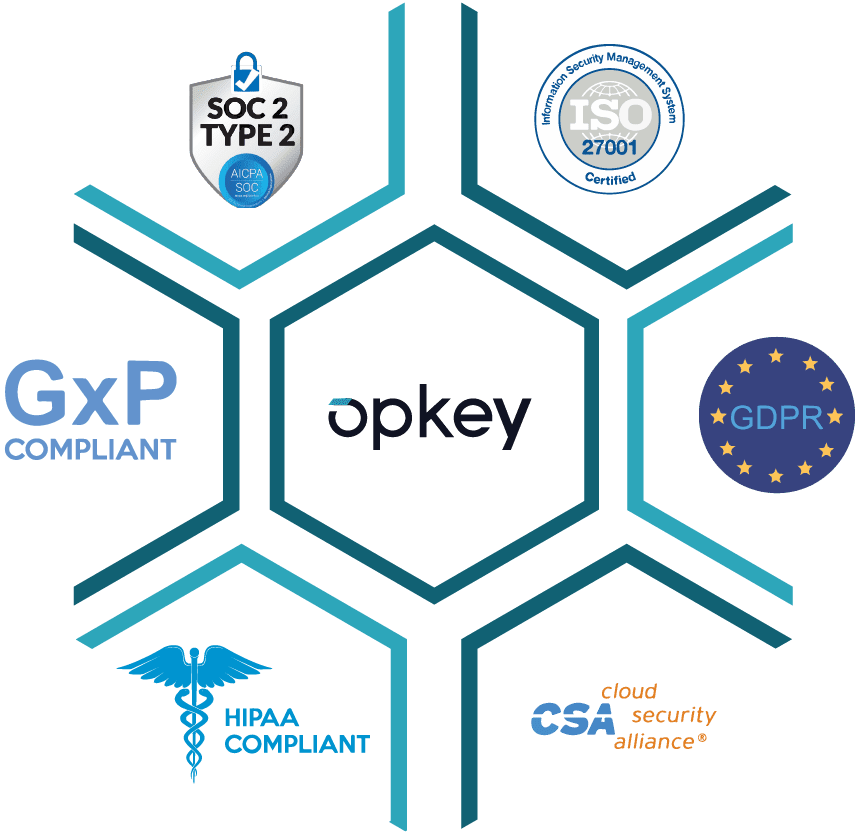Enterprises in every industry need efficient software. However, some industries are much more heavily regulated than others, and this can complicate development and testing timelines. This blog will define what it means to be GxP compliant and examine the impact of these compliance requirements have on software testing. We will also explore how recent advances in AI and test automation help accelerate GxP validation.
What Is GxP Compliance?
GxP is a single term that refers to a variety of quality standards and regulations, all relating to the healthcare, life sciences, food, beverage, and pharmaceutical fields. GxP compliance implies that a software system adheres to a certain set of best practices and regulatory guidelines. The phrase itself stems from “Good Practices Compliance.”
GxP system compliance guarantees that companies adhere to high quality, efficacy, and safety requirements for their processes, products, and documentation. Violating GxP system validation requirements can lead to potential fines, recalls, reputation harm, and legal issues.
These industries are governed by regulatory agencies like:
- The Food and Drug Administration (FDA) (USA)
- Federal Communication Commission (FCC)
- International Organization for Standardization (ISO)
- EU Medical Device Regulation (MDR)
- The European Medicines Agency (EMA)
What Is GxP Validation?
Verifying that you’re following these procedures is known as GxP validation. This is a written procedure that shows how a system works within defined limits for a particular intended use. Along with guaranteeing adherence to legal and quality standards, GxP also supports data integrity, product safety, and consumer health protection.
Several crucial phases are involved in the GxP validation process, including:
- Planning: Planning entails defining the scope and determining what must be validated.
- Specification: Outlining the conditions and establishing the benchmarks for results.
- Design Qualification (DQ): The process of recording the system’s design and making sure it complies with all requirements.
- Installation Qualification (IQ): Verifying that the installation complies with the manufacturer’s criteria is known as installation qualification, or IQ.
- Operational Qualification (OQ): Proving the system works as intended under predetermined circumstances.
- Performance Qualification (PQ): Demonstrating that the system operates reliably and efficiently under typical circumstances.
- Revalidation: This ensures that the system continues to be compliant.
Why Is GxP Compliance and Validation Important?
Government entities and agencies regularly monitor and enforce GxP compliance via audits, inspections, and certification requirements monitoring. As a result, digital firms in regulated industries must do due diligence to understand all legal obligations before launching a product.
Below are several reasons GxP is so important:
- The GxP systems validation process includes identifying and managing risks associated with important functions, equipment, and systems in order to ensure product safety and quality.
- A commitment to compliance reduces failures and deviations that could lead to quality issues, product recalls, or consumer harm.
- GxP computer system validation guarantees that testing, production, and distribution processes operate as expected. Often, lives are at stake (eg. a defective pharmaceutical could put a patient’s life at risk).
Who Are Major Stakeholders in GxP System Compliance?
GxP computer system validation is a shared responsibility for everyone in the company in question. Below is a list of key players:
- Executive leadership and management: The management is responsible for developing the overall compliance strategy, allocating resources, implementing procedures, and pushing for a compliance culture.
- Quality Assurance (QA) department: QA ensures that systems and procedures adhere to regulatory requirements and quality standards. QA personnel are responsible for computer system validation, document control, training, auditing, and inspections.
- IT department: The IT department is responsible for implementing, maintaining, and supporting GxP systems. IT collaboration with other departments ensures that systems are effectively implemented, evaluated, maintained, and meet cybersecurity standards.
- Testers: Testers are dedicated to the validation process. They create validation plans, build test scripts, carry out validation testing, and document the results. They verify that computer systems meet all set requirements and work properly in a controlled environment.
- Regulatory Affairs team: Regulatory Affairs analyzes and interprets applicable rules and laws to ensure that GxP systems meet regulatory standards.
Why Is Test Automation Vital for Effective GxP Compliance?
Testing plays a critical role in establishing and maintaining GxP compliance, through continuous validation. However, due to time and budget restrictions, testing to a satisfactory degree can be challenging for many firms. The stringent standards of GxP validation might be challenging to meet with manual testing methods because they can be labor-intensive and prone to errors.
A growing number of businesses in regulated sectors are using test automation to achieve GxP compliance with their desired coverage and accuracy levels. You can make better use of your resources by automating time-consuming and repetitive operations.
Significance of Testing for Healthcare Apps
- Lack of testing can result in a security breach that can result in hefty fines under compliance and standards.
- Issues in medical data can cause practitioners to make incorrect decisions.
- Inadequate testing for UI/UX design can make a program difficult for its users.
- Your app must be tested to work on multiple devices or operating systems.
- Problems with medical device software connectivity can compromise patients’ personal details.
How Test Automation Tools Like Opkey Improve Your GxP Validation Process
Businesses in regulated industries have few options to build GxP-compliant software. However, this can be a huge burden due to changing standards, staffing shortages, and strict timelines. Therefore, organizations must employ AI-based testing tools to meet their growing testing needs.
“The testing challenge grows in tandem due to strict regulations. If these systems were tough to test in the days of quarterly release cycles, what is the situation now that software is evolving in a matter of days..or even minutes? “
Opkey complies with some of the most stringent IT security practices in the world.

Opkey streamlines compliance management by providing a consistent platform for assessing and approving all development activities. Opkey is proven to speed up software validation and assure overall GxP compliance.
Book a demo to find out why leading life sciences companies like Sparta Systems have already chosen Opkey to improve their software testing and computer system validation.
Frequently Asked Questions
For industries and businesses engaged in the creation, production, testing, and distribution of goods where quality and safety are crucial, GxP regulations and guidelines are important. Pharmaceuticals, biotechnology, medical devices, food and beverage, cosmetics, veterinary products, agricultural chemicals, and clinical research organizations (CROs) are some of the important industries and business categories that must follow GxP regulations.
It is advisable to ascertain the particular regulatory frameworks that are relevant to your sector and organization before moving forward with GxP guidelines and planning. Then, use the following recommended practices to make your program GxP compliant.
- Good Manufacturing Practices: Good Manufacturing Practices, or GMP for short, is a collection of quality control procedures designed for use in manufacturing settings.
- Good Software Engineering Practices: All software development and testing will occur in a controlled and compliant manner if Good Software Engineering Practices (GSEP) are followed.
- Good Clinical Practices: Good Clinical Practices (GCP) is a global set of quality standards that regulate clinical trials with human participants. These criteria are primarily concerned with ethics and science, and they ensure that study participants are treated safely and humanely within regulatory compliance. Furthermore, Good Clinical Practice standards ensure data veracity and integrity.
- Good Laboratory Practice: If your company uses laboratory software to gather or process data, it must adhere to Good Laboratory Practices (GLPs), a set of quality standards for ensuring dependability and integrity in non-clinical laboratory investigations.
- Good Documentation Practices: Following Good Documentation Practices (GDP) can help demonstrate compliance across all regulatory regimes.
- Good Automated Manufacturing Practices: The Good Automated Manufacturing Practices (GAMP) principles are intended to help develop and maintain automated systems.
The QA department is mainly accountable for ensuring that all processes and systems meet GxP standards. They are in charge of implementing and maintaining the quality management system, conducting internal audits, and ensuring that corrective and preventative measures (CAPA) are carried out.
The breadth and specific requirements of software assessments tend to differ since GxP compliance is not overseen by a single entity. However, the method often entails a comprehensive analysis of the software development lifecycle.With this in mind, we’ve identified some of the most important prerequisites for establishing GxP compliance in your program.
- Documentation: Software documentation should cover the full production process, including development, configuration, testing, maintenance, and decommissioning.
- Data Integrity and Protection: Demonstrating data integrity, dependability, and protection throughout the development and deployment process is an important aspect of GxP compliance. Keep in mind that GxP data needs may differ among regions.
- Training: Companies should have training programs in place to educate end users on software functionality and compliance issues. It is vital to establish training policies using standard operating procedures and update them with each new release.
- Validation: Software must also go through a rigorous validation procedure to guarantee that it functions properly and can produce the desired results. Validation should occur at several levels, including functionality, user interface, and data integrity.
- Change Management: Businesses must implement a change management policy that documents all modifications and releases. Documenting all ongoing testing, updates, and evaluations is an essential component of change management.




